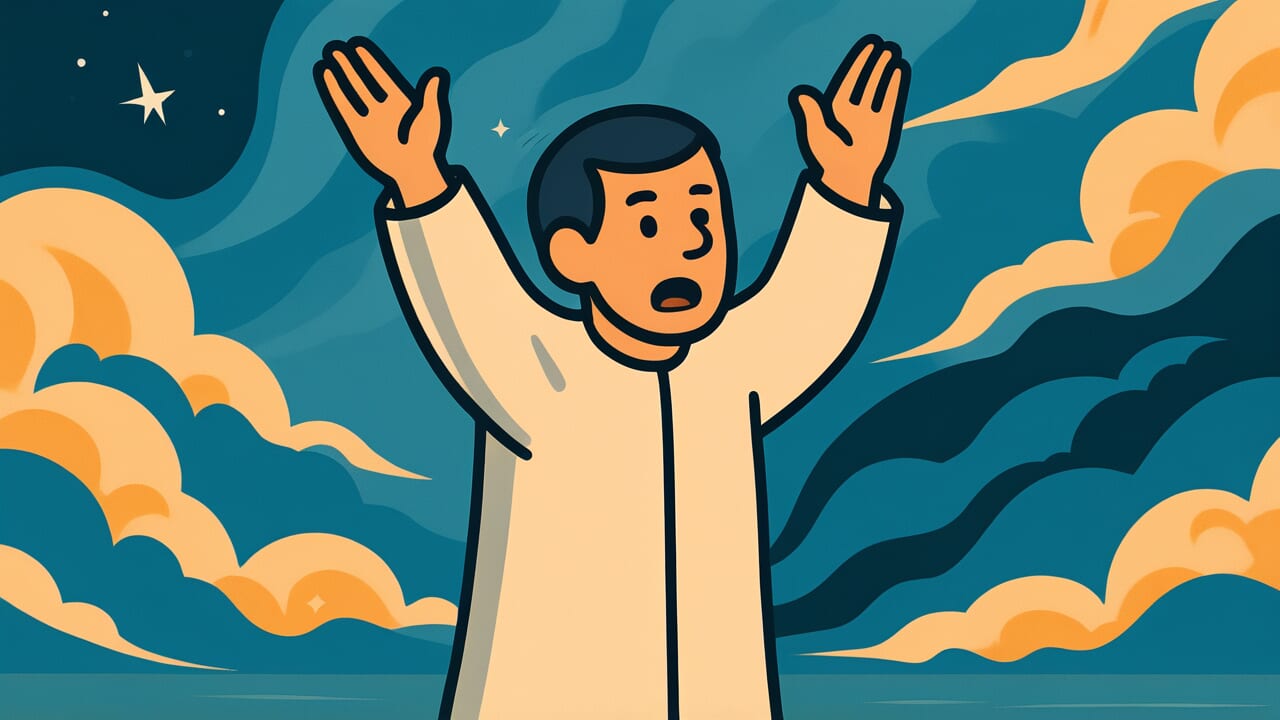How to Read “Relying on god when in distress”
Setsunai toki no kami danomi
Meaning of “Relying on god when in distress”
“Relying on god when in distress” is a proverb that warns against the selfish attitude of turning to god only when in trouble.
It criticizes people who show no faith and never respect gods or Buddha in daily life. Yet when they face hardship, they suddenly rush to shrines and temples seeking help.
This proverb points out someone’s inconsistent behavior. For example, it applies to students who never study but visit shrines right before exams.
It also describes people who ignore their health until they get sick, then desperately pray to gods for recovery.
The lesson this proverb teaches remains relevant today. Modern society often seeks instant solutions to problems.
This makes the proverb even more important. It reminds us of the value of daily effort and consistent attitudes.
Origin and Etymology
No clear written records exist about the origin of this proverb. However, we can make interesting observations from how the phrase is constructed.
First, let’s look at the expression “setsunai toki” (distressing time). Today, we often use “setsunai” to describe romantic feelings or loneliness.
But in classical Japanese, “setsunashi” mainly meant “painful,” “difficult,” or “distressing.” So “setsunai toki” in this proverb refers to situations where people feel cornered both physically and mentally.
The term “kami danomi” (relying on god) is also fascinating. Japan has long held beliefs in countless gods and spirits.
People have traditionally offered prayers to gods and Buddha in daily life. Yet people who aren’t usually religious rushing to shrines only when in trouble was apparently a common sight even in old times.
This proverb sharply points out this selfish human behavior pattern. People don’t respect gods during peaceful times.
Only when facing difficulties do they suddenly seek help. The proverb warns against such convenient attitudes.
It likely arose naturally among common people and was passed down through generations. It shows how our ancestors keenly observed human weakness and selfishness.
Usage Examples
- You never study and just play around, but now you’re visiting shrines before exams? That’s “relying on god when in distress.”
- My father suddenly started visiting shrines after his health checkup showed problems. I thought it was truly “relying on god when in distress.”
Universal Wisdom
The proverb “Relying on god when in distress” sharply exposes fundamental human weakness and contradiction.
Why has this saying been passed down for so long? Perhaps because everyone can relate to this behavior deep down.
Humans naturally struggle to maintain consistency. When things go well, we overestimate our own abilities.
When facing difficulties, we suddenly become humble. This contradictory attitude appears across all cultures and time periods.
This proverb acts like a mirror that mercilessly reflects human convenience. Yet interestingly, it doesn’t just criticize.
Rather, it contains empathy: “You, me, everyone tends to act this way.” No one is perfect.
That’s why it helps us recognize our own selfishness. It reminds us of the importance of living honestly every day.
This proverb isn’t about whether you have religious faith. It’s about the value of living with consistency.
Don’t change your attitude only when in trouble. Face things sincerely during ordinary times too.
That accumulation becomes the true strength that supports you. This is the universal life wisdom the proverb teaches.
When AI Hears This
The human brain processes gains and losses asymmetrically. Kahneman’s experiments showed that losing 10,000 yen feels about 2.25 times more painful than gaining 10,000 yen feels good.
This means even people who normally don’t rely on gods experience amplified pain when entering “loss situations” like illness or exam failure. The pain feels more than twice as intense as usual.
Even more interesting is how humans choose safe options when facing gains but suddenly become gamblers when facing losses.
For example, most people choose “definitely receive 50,000 yen” over “50% chance of 100,000 yen.” But when choosing between “definitely lose 50,000 yen” and “50% chance of losing 100,000 yen,” they pick the latter.
This happens because of the psychology of not wanting to confirm a loss.
Relying on god is an extreme example of this. Scientifically, the success rate of divine intervention approaches zero—an ultra-high-risk gamble.
But when facing the “certain loss” of distressing situations, the human brain is programmed to grab any option that might avoid loss, no matter how low the probability.
This proverb recognized hundreds of years ago how humans lose rationality in loss situations and rush toward statistically meaningless actions. It understood this quirk of the brain.
Lessons for Today
This proverb teaches modern people the importance of small daily accumulations. In our busy lives, we tend to focus only on immediate concerns.
Health management, relationships, skill development, and spiritual richness—we postpone all these things because “we’re not in trouble right now.”
But think about it. When you’re truly in trouble, suddenly asking for help rarely solves things immediately.
You can’t recover health in one day. Trust relationships can’t be built overnight.
Knowledge and skills can’t be acquired in time if you panic and try to learn them only when needed.
That’s why preparation during peaceful times matters so much. It doesn’t have to be difficult.
Move your body a little each day. Express gratitude to people you care about. Make time to learn new things.
These small habits accumulated become the real strength that supports you.
This proverb asks you a question. What will you do today for your future self?
Instead of panicking when in trouble, why not start walking forward honestly, one step at a time, from this very moment?



Comments